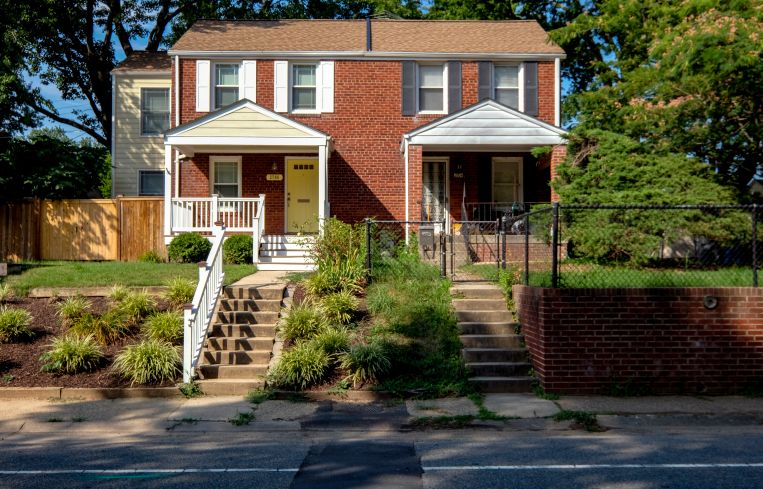Alexandria Approves Controversial ‘Zoning for Housing’ Package
Initiative effectively ends single-family zoning, among other measures
By Nick Trombola November 29, 2023 5:14 pm
reprints
The Alexandria City Council voted unanimously to end single-family-only zoning Tuesday night, part of a larger package aimed at restructuring the city’s housing ordinances.
Packaged together with other zoning proposals in an initiative dubbed “Zoning for Housing,” the decision is intended to provide more housing options across the city’s roughly 15 square miles. The move comes after Arlington County passed similar reforms earlier this year, following an acrimonious and years-long process, which is now the subject of a lawsuit brought by Arlington residents.
Under the new zoning package, buildings with up to four units will be allowed on lots previously designated for single-family homes, which account for about one-third of Alexandria’s land, according to the city. The initiative could add an estimated 2,838 new dwellings over the next 10 years – going a long way toward fulfilling the city’s pledge to create thousands of new units by 2030 to meet regional housing goals set by the Metropolitan Washington Council of Governments. City officials could not immediately be reached for comment regarding the vote.
Advocates of the plan said the new ordinances will help reverse a legacy of exclusionary housing rules while also providing less expensive housing options in a city suffering from an affordable housing crisis. The median sale price for homes in Alexandria was nearly $618,000 last month, according to Redfin.
“Passing Zoning for Housing is a momentous step toward a better future for all Alexandrians,” said Peter Sutherland, Alexandria lead for YIMBYs of NoVA. “These reforms are progress toward erasing the vestiges of segregation and exclusion in our city’s zoning code, and a critical step on the long journey to address our housing crisis.”
Yet opponents of the plan, such as Roy Byrd, chair of the Coalition for a Livable Alexandria (CLA), criticized the city for rushing the initiative through the approval process and argued that the changes would not significantly lower housing costs in what is already the most densely populated city in Virginia.
After months of teasing the initiative, the city had unveiled the proposal details only in September, and the actual text for community review in October, giving residents little time to thoroughly review the plans before the vote on Tuesday, Byrd argued.
In addition, Byrd, who owns a home in Alexandria, and who is African-American, said that while the drive to atone for racist housing policies is well intentioned, it seeks to fix a problem that no longer exists.
“It’s a question of economics. … I can think of no neighborhood [in Alexandria] that would deny people of color from moving in,” Byrd told Commercial Observer before Tuesday’s vote. “If it seems exclusionary, it’s because of the wealth gap.”
The CLA’s messaging appeared to gather steam ahead of council’s vote. Hundreds of Alexandria residents attended a rally outside of Alexandria’s City Hall on Saturday to voice opposition to the initiative, according to CLA’s newsletter.
“The turnout of those directly impacted by ZFH had little to do with either the city or council. It came about because CLA with meager resources and in less than 60 days managed to do what the city could not or would not do,” Byrd said in a statement after the vote. “Sadly, this was a missed opportunity for our elected officials. They could have shown real leadership and brought the city together. Instead they chose a path of divisiveness, ignoring, dismissing, and denigrating the concerns of a majority or Alexandria residents.”
Of 1,059 Alexandria residents, 58 percent opposed the initiative, while just 26 percent supported it, according to a poll commissioned by CLA and conducted by Alexandria-based Bellwether Research & Consulting.
“CLA is not going away,” Byrd added. “We will continue to shine a light on this flawed public policy, and other initiatives impacting quality of life and livability, where the city and elected officials pursue a singular view.”
Several city parking rules were also amended as part of the Zoning for Housing vote on Tuesday, including the removal of required parking spots at residential buildings near Metro stations and bus stops. The relaxed parking rules are designed to encourage more development near mass transit zones.
Parking rules will also change depending on the number of housing units at a given property. One- and two-unit buildings will require at least one off-street parking spot, while three- and four-unit buildings will require at least two spots.
Nick Trombola can be reached at NTrombola@commercialobserver.com.



